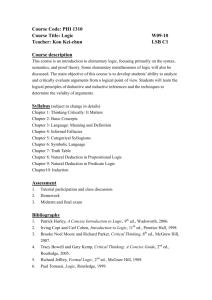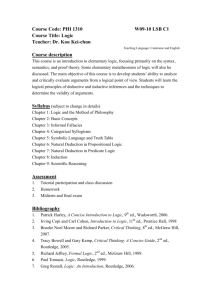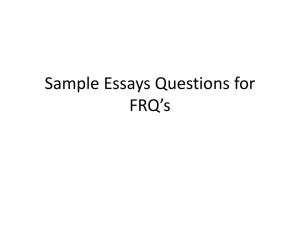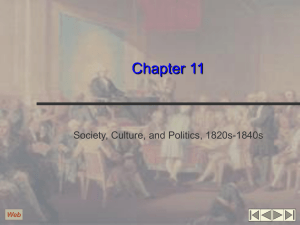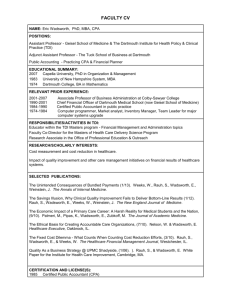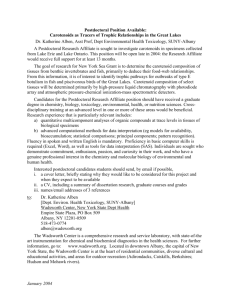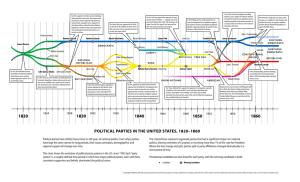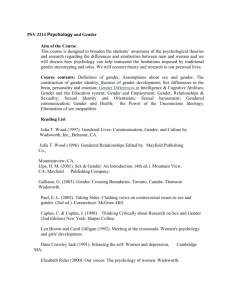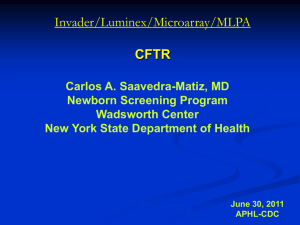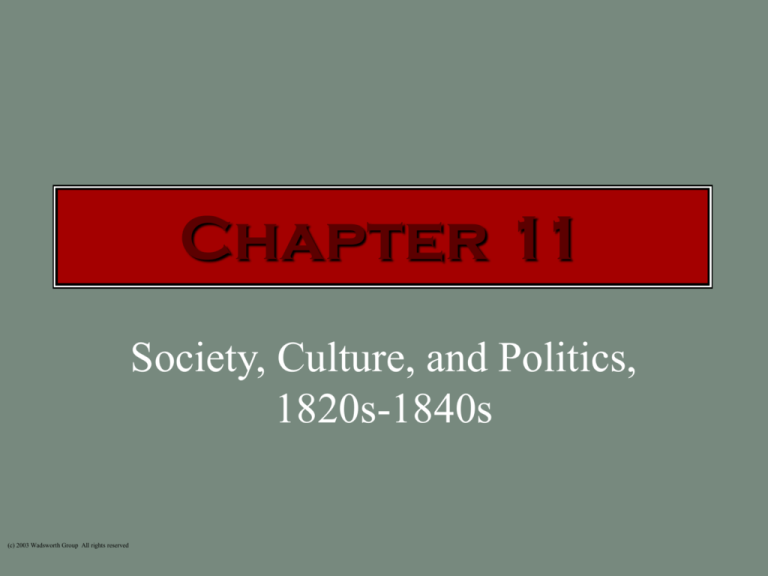
Chapter 11
Society, Culture, and Politics,
1820s-1840s
(c) 2003 Wadsworth Group All rights reserved
Constituencies
• Two Parties: Democratic and Whig
• A man’s party affiliation showed personal identity,
as well as political preference
• Youngest and poorest white men rarely voted
• Party loyalists shared political culture despite
diversity of interest groups from which they came
• The 2 parties proposed coherent programs that
appealed to their respective political cultures
(c) 2003 Wadsworth Group All rights reserved
The North and West
• Whigs
– Market revolution
– Finneyite revival
• Democrats
– Claimed to defend Jeffersonian republic
– “Butternuts”
– Immigrants
(c) 2003 Wadsworth Group All rights reserved
The South
• 1830s and 1840s: Southerners evenly divided their
votes between Whigs and Democrats
– Party preference tied to difference in economic life
• Isolationist neighborhoods: Democrats
• Cosmopolitan areas: Whigs
• Prestige of local leaders like John C. Calhoun
influenced party preference
• Religion little to do with political preference
(c) 2003 Wadsworth Group All rights reserved
Summary of party divide
Whigs
• Benefited from or
expected to benefit
from Market
Revolution
• Wanted government to
subsidize economic
development
Democrats
• Minimal government
• Low taxes
• Leave citizens,
families, and
neighborhoods alone
The Politics of Economic
Development
• Whigs and Democrats both wanted market
society
– Whigs: economically and morally progressive
republic (hierarchical)
– Democrats: viewed market society with
suspicion – that it be subservient to republic
(c) 2003 Wadsworth Group All rights reserved
Government and Its Limits
• Whigs
– Government should foster economic development,
moral progress, and social harmony
– U.S. has harmony of class interests and equality of
opportunity
• Democrats
– Government and market power must be limited to
protect the civil and legal equality of free men
(c) 2003 Wadsworth Group All rights reserved
Banks
• States in control of banking and credit regulation
• Whigs: banks agents of economic progress
• Democrats: banks agents of inequality used to
enrich the privileged
• Uniform banking laws instead of individual
charters
• “Hard Money” Democrats
• Whigs support right of banks to circulate bank
notes
(c) 2003 Wadsworth Group All rights reserved
Internal Improvements
• Democrats block federal funding of internal
improvements
• Whigs push for state funded internal improvements
– William H. Seward, Whig governor of N.Y.
• Democratic state legislators opposed “partial”
legislation: benefiting part of their state at the
expense of the rest
– Opposed projects leading to taxes and debt
(c) 2003 Wadsworth Group All rights reserved
The Politics of Social Reform
• Whigs used government to improve
individual morality and discipline
– Prostitution, temperance, public education,
asylums and penitentiaries
• Democrats felt morality through legislation
was anti-republican
• Social reform provoked angry differences
between the two parties
(c) 2003 Wadsworth Group All rights reserved
Public Schools
• Common school movement
• Whig School reform
–
–
–
–
Horace Mann
Henry Barnard
Calvin Stowe
The Thinker, A Moral Reader (1855)
• Party differences about organization of schools
– Whigs want state-level centralization
– Democrats preferred local school districts
(c) 2003 Wadsworth Group All rights reserved
Ethnicity, Religion, and the
Schools
• Issues for many Irish Catholic immigrant
children
– Offensive texts and Bibles used in schools
– Some parents refused to send children to school
– State subsidy for Parish schools
• Foreign language schools for bilingual
instruction created
• State-supported church-run charity schools
(c) 2003 Wadsworth Group All rights reserved
Prisons
• State governments built and supported institutions
for orphans, dependent poor, insane, and criminals
– Market Revolution increased visibility of these groups
and cut them off from family resources
– Reformers assert these groups exist because of bad
family situation
• Both political parties favored state-support for
criminals and dependents
– Whigs favored rehabilitation
– Democrats favored isolation and punishment
• “Auburn system”
(c) 2003 Wadsworth Group All rights reserved
Asylums
• Dorothea Dix
• By 1860: legislatures of 28 out of 33
states established state-run insane
asylums
• Few Democrats supported insane
asylums
(c) 2003 Wadsworth Group All rights reserved
The South and Social Reform
• Many Southern voters perceived attempts at social
reform as “expensive and wrong-headed”
• Southern schools
– Locally controlled
– Limited curriculum
• Southern prisons
– Auburn system
• Temperance succeeds for individuals, but no state
level prohibition
• Southern resistance to social reforms
– Doomed to failure because of human imperfection
– Seen as self-righteous imposition of Northeasterners
(c) 2003 Wadsworth Group All rights reserved
Excursus: The Politics of Alcohol
• Whigs demanded social and moral reform
• Democrats feared big government and the
Whigs’ cultural agenda
• The question of temperance began to
define differences between Whigs and
Democrats
(c) 2003 Wadsworth Group All rights reserved
Ardent Spirits
• American Temperance Society (1826)
• Lyman Beecher
– Six Sermons on the Nature, Occasions, Signs, Evils, and
Remedy of Intemperance (1826)
• Charles Grandison Finney
– Abstinence from alcohol condition for conversion
• Temperance becomes badge of middle class
respectability
• American Congressional Temperance Society
• Military ends traditional liquor ration 1832
• Alcohol consumption cut in half by 1840
(c) 2003 Wadsworth Group All rights reserved
The Origins of Prohibition
• Mid-1830s: Whigs made Temperance a political
issue
• “Fifteen-Gallon Law” in Massachusetts
• Democrats: Forced temperance violate
Republican liberty
• Alcohol becomes defining political difference for
many
(c) 2003 Wadsworth Group All rights reserved
The Democratization of
Temperance
• Democrats not opposed to individual
temperance, opposed to prohibition
• Washington Temperance Society
– “True Washingtonians”
(c) 2003 Wadsworth Group All rights reserved
Temperance Schisms
• Whigs: temperance as an arm of evangelical
reform
• Washingtonians continued working class popular
culture without alcohol
• Whig reformers tied abstinence to individual
ambition and middle-class domesticity
• Washingtonians sought to rescue the self-respect
and moral authority of working-class fathers
(c) 2003 Wadsworth Group All rights reserved
Ethnicity and Alcohol
• 1840s-1850s: millions of Irish and German
immigrants
• Germans: lager beers, old-country beer halls
• Irish: whiskey, bars
– Legitimized levels of male drunkenness and
violence
• Nativism and temperance politics merge in
the 1850s at expense of Democrats
(c) 2003 Wadsworth Group All rights reserved
The Politics of Race
• Traditional view: God gave white males
power over others
• Whig evangelicals
– Marriage changes from rank domination to
sentimental partnership
– The emergence of a radical minority
envisioning a world without power
– Attacked slavery and patriarchy as national
sin
(c) 2003 Wadsworth Group All rights reserved
Free Blacks
• North: states began to abolish slavery
– Revolutionary idealism
– Slavery was inefficient and unnecessary
• Gradual emancipation (Pennsylvania model)
• Free black populations grew and moved into
the cities
• Many took stable, low-paying jobs
(c) 2003 Wadsworth Group All rights reserved
Discrimination
• Discrimination rises
– White workers drive blacks out of skilled and semiskilled jobs
– Blacks increasingly politically disenfranchised
– Segregated schools
• Blacks build their own institutions
– African Methodist Episcopal Church (1816)
• Black Anti-slavery activism
– David Walker: Appeal to the Colored Citizens of the
World (1829)
– Harriet Tubman
– Frederick Douglass
(c) 2003 Wadsworth Group All rights reserved
Democratic Racism
• Neither Whigs nor Democrats encouraged
aspirations of slaves or free blacks
• Democrats make racism part of their
political agenda—protect the white republic
• Democrats contributed to rise of anti-black
violence
– NYC riot victims: Lewis Tappan, Charles
Finney, English actors
– Philadelphia riots: “the Killers”
(c) 2003 Wadsworth Group All rights reserved
Conceptions of Racial Difference
• Educated whites taught racist “biological
determinism”
• White racists regarded blacks with stereotypes:
– Incompetent, dishonest, treacherous and secretive
• Herman Melville, Benito Cereno
• Democrats: Blacks unfit for citizenship
• Some Whigs support Black suffrage
(c) 2003 Wadsworth Group All rights reserved
The Beginnings of Antislavery
• First anti-slavery efforts die out in early 1800s
• American Colonization Society (1816)
– Gradual, compensated emancipation
– “Repatriation” to Liberia
• Slavery abolished many places outside the U.S.
– Toussaint L’Ouverture and Haiti
– South American Republics
– British Caribbean
(c) 2003 Wadsworth Group All rights reserved
Abolitionists
• William Lloyd Garrison
– The Liberator (1831)
– American Anti-Slavery Society (1833)
• Abolition a logical extension of middle class
evangelicalism
• American Anti-slavery Society demands:
– Immediate emancipation
– Full civil and legal rights for African-Americans
(c) 2003 Wadsworth Group All rights reserved
Agitation
• Abolitionists minority of Evangelicals
– Beecher and Finney say end of slavery will come with
conversion of masters
– Logical end of antislavery is civil war
• “Postal Campaign”
• Petition campaign
• Jackson administration response
– Censor mail
– Right to petition abridged
(c) 2003 Wadsworth Group All rights reserved
The Politics of Gender and Sex
• Whig vs. Democratic masculine styles
– Whigs: sentimentalized homes of northern
business classes, or Christian gentility of Whig
plantations
– Democrats: in favor of domestic patriarchy
(c) 2003 Wadsworth Group All rights reserved
Appetites
• Whig reform often more about domestic and
personal life than politics
• Sylvester Graham and moderation
• John Humphrey Noyes
– Oneida (N.Y.) community
(c) 2003 Wadsworth Group All rights reserved
Moral Reform
• Middle-class ideal: combination of female
purity and male self-control
• Magdalen Society
– First Annual Report (1831)
• Female Moral Reform Society
– The Advocate of Moral Reform
(c) 2003 Wadsworth Group All rights reserved
Women’s Rights
• Women’s role as missionaries to their family make
them public reformers
• Antislavery movement leads women to advocate
for equal rights
• State legislative changes in favor of women
– Married Woman’s Property Act (New York 1860)
• Women’s Rights Convention, Seneca Falls, NY
(1848)
– Declaration of Sentiments and Resolutions
– Female participation in politics
(c) 2003 Wadsworth Group All rights reserved
Conclusion
• 1830s: most citizens firmly identified with
one of the two parties: Whig or Democrat
• Whigs: embraced commerce and activist
government
• Democrats: localistic and culturally
conservative
(c) 2003 Wadsworth Group All rights reserved

